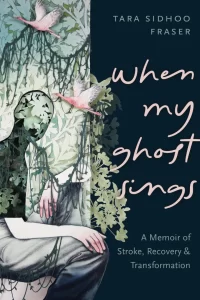Upon first reading When My Ghost Sings by Tara Sidhoo Fraser, I expected a story describing the author’s experience before and after recovering from a brain injury, but what I didn’t expect was the beautiful, vivid imagery that places the reader in the story and hurls a variety of emotions at them.
When My Ghost Sings, Fraser’s debut book, is a compelling memoir that explores her life after suffering from a stroke caused by a rare brain mutation called arteriovenous malformation, or AVM. The stroke also caused Fraser to lose all memories of her former life.
Through her Ghost (who she used to be before her stroke), Fraser attempts to piece together her past with the help of fragmented memories that Ghost presents to her in a slideshow or a misty movie. The story switches focus between Fraser’s life with her partner Jude, and documents their combined struggles of Fraser’s effort to uncover her past. The story is juxtaposed by sweet, happy moments with Jude and sorrowful, hollow moments of the past.
With the help of The Boy, Ghost’s former boyfriend, Fraser is able to come to a hazy understanding of the events that occurred before her stroke took place. Despite being present for the entirety of Ghost’s death, The Boy often provides Fraser with vague descriptions of what happened that morning in November. The Boy is surrounded with a sense of mystery, as Ghost wails her song and wishes to be with him, despite the fact that Fraser has found her own love away from her forgotten past.
By uncovering and reliving the memories of Ghost’s past, Fraser is able to come to a better understanding of the events that led to Ghost’s death. By understanding and accepting the events of her past, Fraser provides Ghost with closure and Ghost knows that she will not be forgotten.
Fraser uses her gift of imagery and descriptive language to paint a picture of her story, whether it be the tall trees of Vancouver Island, the quaint coffee shops of Seattle, or even the hospital where Ghost died. Fraser’s gift of language makes Ghost’s hazy, distant memories feel as though the reader is a part of this strange dream-like sequence of events. The use of descriptive language makes people within her story more life-like—you can feel the love she holds for them within each description.
The book would be best for those who would like to have a better understanding of strokes and brain injuries and how it affects those who have them. The story would also be great for someone who enjoys vivid, cinematic imagery that takes you on a unique and powerful journey.
When My Ghost Sings presents the themes of recovery and living with the aftermath of a stroke, but, most importantly, presents an overall theme of love and creating a love that is wholly your own.

